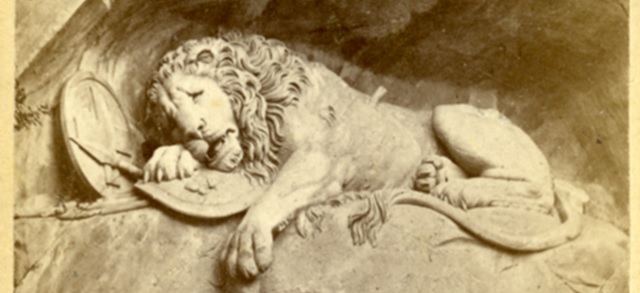
Monuments Class Projects
Architect/Sculptor of Monument
Andreas Schlüter (Sculptor)
Preview

Medium
photograph, carte-de-viste
Keywords
Friedrich Wilhelm I, Great Elector, Friedrich Wilhelm I the Great Elector, Friedrich Wilhelm I Elector of Brandenburg, Germany, Equestrian Statue, Friedrich Wilhelm, Prussia, King of Prussia, Friedrich Wilhelm of Prussia, 1713-1740, Europe, History, Western, King, Berlin, Charlottenburg Palace, Sculpture, Baroque, Andreas Schlüter
Physical Dimensions
Height: 101 mm Width: 62 mm
Date of Publication
18uu
Name of Monument
Friedrich Wilhelm I, the Great Elector Statue
Date of Creation of Monument
1708
Date of Completion or Dedication of Monument
1708
City of Monument
Berlin
Location within City
Charlottenburg Palace
State/Province of Monument
Berlin
Country of Monument
Germany
Description
A carte-de-visite photograph of the Equestrian Statue of Friedrich Wilhelm the Great Elector set in front of the Charlottenburg Palace in Berlin Germany. The statue was created by Andreas Schlüter in 1708 and depicts the Great Elector on horseback with slaves in chains around the base of the statue. The relief on the base of the statue is dedicated to King Friedrich I (1657-1713), the son of the Great Elector, who had become the Prussian king by the time the statue he commissioned had been finished.
School of Art/Architecture
Baroque Sculpture
Digital Date
3-6-2022
Copyright
Original physical carte-de-viste is in the public domain. Digital copy scanned by Rod Library, ©2022 Rod Library, University of Northern Iowa.
Creative Commons License

This work is licensed under a Creative Commons Attribution-NonCommercial 4.0 International License
File Format
image/jpeg



Comments
The statue is of Friedrich Wilhelm the Great Elector (1620-1688), who set the stage for Friedrich Wilhelm I to turn Prussia into a monarchy and become its king. He funded the creation of the statue. The title on the front of the CdV, “Der Grosse Kurfürst”, is the German title of the Great Elector, translating roughly to the same thing. The statue currently stands in front of the Charlottenburg Palace in Berlin, Germany (but was originally planned to be on a bridge across the Spree river). The palace was built by Friedrich I (1657-1713) and was completed by Andreas Schlüter, the same artist who created the statue. The palace served as an administrative center for the Prussian monarchy until 1888, by which time it had become the German monarchy. The palace and statue both heavily draw upon a Baroque style of sculpting. The statue itself is on a typical Baroque pedestal, with intricate carvings on the sides and flairs on the corners. It shows the Great Elector on horseback, looking over the plaza while dressed in Roman clothing which was common in the rococo style. Along the base of the statue, there are four men in chains looking up at the Great Elector, signifying the enemies he conquered while commanding the Prussian armies. The military was Prussia’s greatest accomplishment and source of pride, so it was important to represent their victories within this statue.
Open-source collection of photos of the statue and other Schlüter works:
#61 - Andreas Schlüter, von dr. Ernst Benkard. - Full View | HathiTrust Digital Library